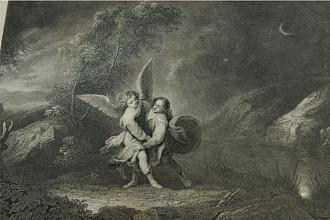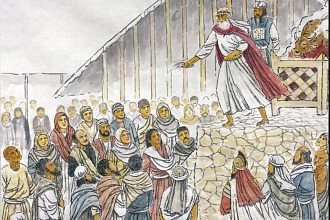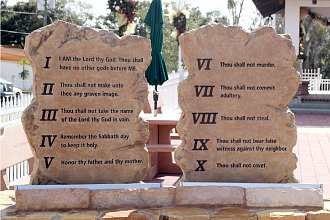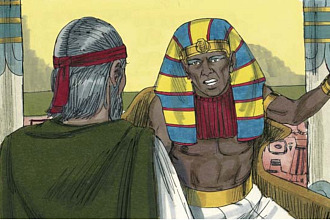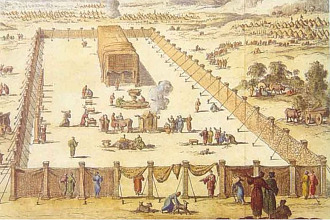Parasha for the Week: Shelach Lecha Numbers 13:1 – 15:41
Haftara for the Week: Joshua 2
Besorat Yeshua: Mark 4:35 – 5:8
Overview
The history of the 12 spies searching out the land of Canaan is recorded.
G-d instructs Moshe concerning the offerings to be made when we will finally enter the Land.
The laws for an offering after an inadvertent sin, for an individual or a group, are explained.
If someone blaspheme G-d and be unrepentant, he will be cut off spiritually from his people. One man is found gathering wood in violation of the laws of Shabbat and he is executed.
The laws of tzitzit are taught.
"Our Faith in G-d"
Parshat Shelach begins with the story of the “Meraglim”—the “spies” which Moshe sent to scout the land of Israel. Although G-d promised Abraham, Isaac and Jacob that He will give us the land of Israel, the people demanded that Moshe send spies to evaluate the land and report back. With G-d’s permission, Moshe sent the spies to scout the land of Canaan (Israel).
The Torah states “And the L-rd spoke to Moshe, saying, ‘Send to you men that they may spy the land of Canaan which I give to the children of Israel...” (Num 13:1-2). Moshe chose twelve men—one from each tribe—to go forth and check out the promised land. Moshe instructed them, “...See the land what it is and the people that dwell there whether they are strong or weak, are they few or many. Is the land good or bad; what are the cities in which they dwell in... Is the land fat or lean...” (Num 13:17-19). Moshe instructs them to bring back of the fruits of the land.
Moshe chose pious and righteous men for this important mission. They came back after forty days, carrying huge pieces of fruit. Sadly, ten of the spies spoke negatively and discouraged the people from conquering the land. They said, “We will not be able to go up against the people for they are stronger than we” (Num 13:31). Only Joshua and Kalev encouraged the people to have complete faith in G-d “for we will conquer the land.”
The Torah tells us that the children of Israel listened to the ten spies and “they wept that night,” (Num 14:1) refusing to enter the promised land; “All the congregation of Israel murmured against Moshe and Aaron and they said to them, ‘We would have preferred to have died in the land of Egypt or in this wilderness. Why does G-d bring us into this land to fall by the sword... were it not better for us to return to Egypt...” (Num 14:2-3). As a result of this tragic event, the Jewish people remained in the desert for forty years (one year for each day the spies were in Israel). Only their children eventually entered the land of Israel under Joshua’s leadership.
The Chofetz Chaim explains why the 10 spies felt we should not enter the land. The evil inclination tries in every possible way to prevent a person from doing good. At times, a we are arrogant and feel that we are already on the highest level and need not do more. At other times, we try to do something good, we start feeling sad and guilt-ridden. We tell ourself that the good we want to do is only possible to accomplish by people on a much higher spiritual level. We immediately remember all the bad things we have done. Even though we might have already regretted those things and repented, we forget this and start feeling so inferior that we lose all desire to accomplish anything good.
Parshat Shelach-Lecha reminds us the importance of faith in G-d and the consequences for the lack of it. Our faith in G-d is put to a test continuously. During the course of a day, one is faced with situations where they may calculate that behaving contrary to G-d’s will and moral standards will bring them success. Our faith in G-d may at times be tested to its limits. Yet, one must always remember that in the end it is G-d’s will which will prevail. When it comes to fulfilling G-d’s commandments and our mission in life, we must not let any obstacles discourage us, no matter how difficult they may be. G-d is with us and He will prevail.
G-d never asks of us more than we can handle. If He commanded it, He will give us the strength and ability to accomplish it. That is a great lesson Rabbi Shaul wanted to give us in one of his letters: “No testing has overtaken you that is not common to everyone. God is faithful, and he will not let you be tested beyond which you are able, but with the testing he will also provide the way out so that you may be able to endure it.” (1 Cor 10:13).
"Moses’ Great Love"
When the spies convinced the people that they will not be able to conquer the Promised Land, the Jewish people rebelled against Moshe. G-d wanted to kill them immediately and reestablish the Jewish people from Moshe. It was only through Moshe’s efforts and prayers that G-d forgave the people and they lived another forty years in the desert.
“Tzitzit”
“Speak to the Israelites, and tell them to make fringes on the corners of their garments throughout their generations and to put a blue cord on the fringe at each corner. You have the fringe so that, when you see it, you will remember all the commandments of the LORD and do them, and not follow the lust of your own heart and your own eyes” (Num 15:38-39)
We perform this mitzvah by wearing the Tallit (prayer shawl), a four cornered garment, during prayer. Many wear a Tallit Katan (small Tallit) all day so they can have the mitzvah all the time. The numerical value of the Hebrew word Tzitzit (90+10+90+10+400) is 600. Each Tzitzah has 8 strings and 5 knots. These numbers add up to 613 which is the total amount of mitzvot. By looking at the Tzitzit, we remember to perform all the mitzvot.
Tzitizit are the fringes which hang on the four corners of the Tallit (prayer shawl). The Torah tells us that each fringe should have one string colored blue. The blue dye was extracted from a special fish-worm called Chilazon. The identity of that particular fish-worm has been lost and as a result all eight strings are white. Some people today wear Tzitzit with a blue string in it.
“Mitvzot”
A diamond merchant went to purchase diamonds. While preparing to make the trip back to his city someone approached him, “I have some diamonds which I must sell immediately for a fraction of their cost if you pay cash for them right now.” After examining the diamonds he realized that this was a great deal. All he had was enough to cover the expenses for the way home, but he felt that he couldn’t pass up a deal like this. He bought the diamonds and traveled back to his home like a poor beggar. He slept on the floor in run down hotels and ate lousy meals with other poor travelers. A friend met him and asked; “Why do you suffer in such conditions, when you can afford good accommodations and delicious foods?” He told his friend the story. “But knowing the life style which you are used to, I don’t understand how you can tolerate to live in such terrible accommodations and eat such cheap food,” asked the friend. “You are right. Many times during this trip, I thought that I could not go on like this any more,” replied the diamond merchant. “Every time I felt like this, I would look at the diamonds which I bought and realizing the potential profit awaiting me, I would become very happy!”
Such is the gems of the kingdom of heaven. It is worth giving up all to receive.
“Complete Cleaning”
On the lighter side: Before the High Holidays, Mr. Goldberg took his Tallit to the new dry cleaners. Two days later he came to pick up the Tallit and was shocked to see the bill for $25. “Why so expensive?” gasped Mr. Goldberg. “It should have cost only $5?” The dry cleaner said; “$5 for the dry cleaning, $20 to get out all the knots.”
HAFTARA Joshua 2
Parasha: In the parasha: “the L-rd spoke to Moshe, saying, ‘Send to you men that they may spy the land of Canaan which I give to the children of Israel...” Moshe chose twelve men — one from each tribe (Num. 8:10-12). One of those spies was Joshua.
Haftara: 40 years later, in our haftara, Joshua is now the leader of the people. “Joshua sent two men as spies, saying, “Go, view the land, especially Jericho.” (Joshua 2:1).
The people of Israel were ready to leave the wilderness and to taste this land of milk and honey. The Canaanites heard what the L-rd had done for Israel and were afraid. Some, such as Rahab a prostitute, had faith in the G-d of Israel and were ready to help them. Rahab said, “I know that the LORD has given you the land, and that dread of you has fallen on us, and that all the inhabitants of the land melt in fear before you. For we have heard how the LORD dried up the water of the Red Sea before you when you came out of Egypt, and what you did to the two kings of the Amorites that were beyond the Jordan, to Sihon and Og, whom you utterly destroyed. (Joshua. 2:9-10). “Since I have dealt kindly with you, swear to me by the L-RD that you in turn will deal kindly with my family. Give me a sign of good faith that you will spare my family and deliver our lives from death.” (Josh. 2:12-13) Rahab become an example of faith “By faith Rahab the prostitute did not perish with those who were disobedient, because she had received the spies in peace.” (Heb. 11:31). She became one of the ancestors of King David and the Mashiach, Son of David. (Matt. 1:5)
Besorat Yeshua Mark 4:35 – 5:8
Parasha: In the Parasha the spies went throughout Canaan to scout the country.
Besorah: In our Besorah it is Yeshua who send his disciples out. “He said to them, “Let us go across to the other side.” (Mark 4:35).
In the Parasha our people were afraid. In the Besorah the disiples were afraid and they cried to Him: “A great windstorm arose, and the waves beat into the boat, so that the boat was already being swamped. But he was in the stern, asleep on the cushion; and they woke him up and said to him, “Teacher, do you not care that we are perishing?” (Mark 4:37-38). But Yeshua was there. “He woke up and rebuked the wind, and said to the sea, “Peace! Be still!” Then the wind ceased, and there was a dead calm. He said to them, “Why are you afraid? Have you still no faith?” (Mark 4:39-40). The example of Rahab will be followed by the disciples and they will get a strong faith in G-d and in the Mashiach. “And they were filled with great awe and said to one another, “Who then is this, that even the wind and the sea obey him?” (Mark 4:41).










